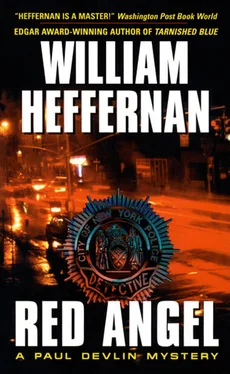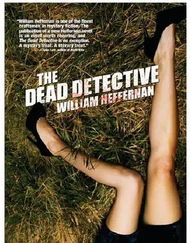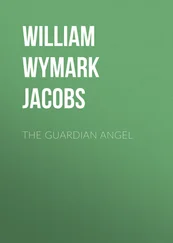William Heffernan - Red Angel
Здесь есть возможность читать онлайн «William Heffernan - Red Angel» весь текст электронной книги совершенно бесплатно (целиком полную версию без сокращений). В некоторых случаях можно слушать аудио, скачать через торрент в формате fb2 и присутствует краткое содержание. Жанр: Триллер, на английском языке. Описание произведения, (предисловие) а так же отзывы посетителей доступны на портале библиотеки ЛибКат.
- Название:Red Angel
- Автор:
- Жанр:
- Год:неизвестен
- ISBN:нет данных
- Рейтинг книги:4 / 5. Голосов: 1
-
Избранное:Добавить в избранное
- Отзывы:
-
Ваша оценка:
- 80
- 1
- 2
- 3
- 4
- 5
Red Angel: краткое содержание, описание и аннотация
Предлагаем к чтению аннотацию, описание, краткое содержание или предисловие (зависит от того, что написал сам автор книги «Red Angel»). Если вы не нашли необходимую информацию о книге — напишите в комментариях, мы постараемся отыскать её.
Red Angel — читать онлайн бесплатно полную книгу (весь текст) целиком
Ниже представлен текст книги, разбитый по страницам. Система сохранения места последней прочитанной страницы, позволяет с удобством читать онлайн бесплатно книгу «Red Angel», без необходимости каждый раз заново искать на чём Вы остановились. Поставьте закладку, и сможете в любой момент перейти на страницу, на которой закончили чтение.
Интервал:
Закладка:
“So what happens now?”
Martinez stepped through the gate and into the street. “I think the colonel’s life is about to take a very unfortunate turn.”
Martinez’s men had followed DeForio to the Calle de los Oficios, a street in Old Havana that had once housed its most prosperous merchants. There, he had entered the Casa de los Arabes, a three-story building of Moorish design with massive wooden doors that were several centuries old.
When Devlin and Martinez arrived, they found Ollie Pitts stuffed into a narrow doorway halfway down the block.
“Cabrera showed up fifteen minutes ago,” he said. “I gather DeForio’s already inside.”
“Did Cabrera go anywhere else first?” Devlin asked.
Pitts shook his head. “Just his office at the Villa Marista. He stayed there all morning, then left around one and came straight here.” He inclined his head toward the other end of the street. “His car and driver are in San Francisco Plaza, over by the docks, near some big church.”
“The Convent of San Francisco,” Martinez said. “For years it was Havana’s central post office. Now Fidel has allowed it to become a church again. But not for religion. The church and the convent have become a museum for tourists.” He smiled at Pitts. “Perhaps it was sentimentality on Fidel’s part. As a boy he studied under the Jesuits.”
“Hey, that’s great,” Pitts said. “Interesting as fucking hell.” He rolled his eyes. The major’s tour-guide act was becoming a pain in the ass. “Anyway, I saw the driver buy a ticket for the car ferry. Now, maybe he’s doin’ this for himself, but it seemed to happen right after Cabrera snapped some orders at him, so the detective in me suspects they might be taking a little boat ride.”
“Did you get a ticket?” Devlin asked.
“Of course,” Pitts said.
Devlin turned to Martinez. “Okay, this is the way I’d like to play this.” He pointed at Pitts. “We’ll let Ollie stick with Cabrera and keep your men on DeForio. You and I will head to wherever this ferry goes and try and get ahead of them. If they all get on the ferry together, your men can radio us and we’ll stay put. If not, if DeForio heads somewhere else when he leaves here, they can radio us and we’ll catch up with them. Sound good?”
Martinez nodded. “It will keep the only people Cabrera might recognize out of sight. It is best when the rabbit cannot see the hunter.”
“Where does the ferry go?” Devlin asked.
“One goes to Casablanca, the other to Regla.” He glanced at Pitts. “Your ticket will be good for both places, but it is unlikely they will go to Casablanca, unless they seek another expensive meal at the Battery of the Twelve Apostles.” He turned back to Devlin. “Regla, however, and the nearby town of Guanabacoa are strongholds of the Abakua.”
16
The Iglesia de la Virgen de Regla faced Havana harbor and offered a clear view of the ferry landing only a few hundred yards away. Standing beside it, an ancient ceiba tree seemed to dwarf the small church in its wide-spreading limbs.
Martinez explained that the presence of the tree, considered sacred in the Afro-Cuban religions, was not a coincidence.
“All Catholicism in Cuba is tied to the orishas , the Afro-Cuban gods,” he said as they entered the church and started down the center aisle.
“Many years ago, when slavery still existed on our island, both Palo Monte and Santeria were banned, and their practitioners greatly persecuted. Because of this, believers began using the Catholic Church to hide their religions. They did this by identifying their gods with various Catholic saints.”
Martinez pointed to the statues of saints that lined the walls of the church interior. “Chango became Santa Barbara because of her traditional red robes, which is also Chango’s color. Oshun, always dressed in gold and white, became the Virgin of Caridad. Eleggua came to be represented by Saint Martin, Oggun by John the Baptist, and so on.”
He stopped in front of the altar and pointed to the statue of a black Virgin dressed in blue and white, the traditional colors of Mary, the mother of Christ. “And. of course, Yemaya, the goddess of the sea and the protector of sailors, the great mother of all the people.”
They started back up the aisle. Worshipers, mostly black, knelt before the plaster replicas of various saints. A second statue of the black Virgin stood near the main entrance, and attracted the largest number of worshipers. Bouquets of flowers had been left at the statue’s feet, along with an assortment of offerings and pleas for help-photographs of loved ones, a scrap of cloth with feathers sewn to it, a bowl of fruit, another of water, a small glass holding a dark liquid that appeared to be rum.
“At first the Catholic Church resisted this syncretism with the African religions.” Martinez stopped and waved his hand in a wide circle. “But the people kept flooding into their churches, and the church saw it was more practical to ignore it. Now it has grown so common some priests actually encourage it. I have even heard priests give sermons in predominantly Negro churches in which the names of the African gods were invoked.”
“I didn’t know you were a churchgoing man,” Devlin said.
Martinez offered a faint smile. “There was a time when the government feared that these priests might try to use these African religions against the revolution. So the police paid very close attention to what was being said. Those fears proved unjustified, but in those days, because of this fear, Sunday became a day when many of us went to mass.” He raised a finger. “But we did not put our pesos in the collection basket.”
Devlin laughed. “I’m sure you didn’t. Marx would have spun in his grave.”
They left the church and headed for the expansive shade of the ceiba tree. From there they could see a car ferry headed toward the landing.
“They will not be on this ferry,” Martinez said. “My men will radio us when they board.”
“I just hope they come, and we don’t find ourselves chasing back to Havana, playing catch-up.”
Martinez stared out into the harbor. “They will come,” he said. “This is where the Abakua palero will perform the ritual of the changing of heads.”
“You seem very certain.”
“I am, my friend. I can feel it.”
DeForio and Cabrera stood on the dock, waiting to board the ferry. Cabrera’s car idled beside them in a long line inching toward the loading bay. DeForio’s Spanish was more than adequate, but at Cabrera’s insistence they spoke only in English, a language the driver did not understand. Cabrera had risen in a system where listeners were everywhere. It was a system he knew better than most, and he saw no reason to take chances.
“So, you have no idea where this niece and these two New York cops are,” DeForio said.
Cabrera glanced out at the water. The car pulled ahead three feet, then stopped again. Still, he lowered his voice. “They will be found. And, when they are, the men searching for them have orders to take them into custody.”
“What happens then?” DeForio asked.
“That depends on how they react to the body we have found for them.” Cabrera glanced at the American. He was lying to him, but that could not be helped. One way or another, the Americans would disappear. He had a secondary understanding with the old man-what Rossi had called a side deal-and it was far too profitable to ignore. “Hopefully, they will accept our findings. If not, I will see to it that they leave the country. It is only important that the government accept the body as that of our Red Angel.” He gave DeForio what he hoped was a confident smile. “And that has already been arranged.”
Читать дальшеИнтервал:
Закладка:
Похожие книги на «Red Angel»
Представляем Вашему вниманию похожие книги на «Red Angel» списком для выбора. Мы отобрали схожую по названию и смыслу литературу в надежде предоставить читателям больше вариантов отыскать новые, интересные, ещё непрочитанные произведения.
Обсуждение, отзывы о книге «Red Angel» и просто собственные мнения читателей. Оставьте ваши комментарии, напишите, что Вы думаете о произведении, его смысле или главных героях. Укажите что конкретно понравилось, а что нет, и почему Вы так считаете.












